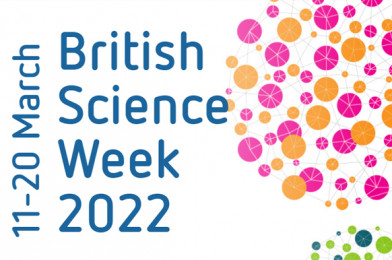Every year, British Science Week dedicates the week to a certain theme. This year the theme is Growth.
Within STEM we looked at the growth of the University, introduced you to Growing Kent and Medway, the development of Sustainability on Campus, and re-capped of our Think Kent lectures.
Over the past few years, the University has grown in size, with the merge with Canterbury Christ Church to produce the Kent and Medway Medical School, the opening of the Kent Sports Clinic and the move of our Sport and Exercise Sciences students from the Medway to Canterbury Campus.
Kent and Medway Medical Centre
Kent and Medway Medical School offers first-class medical education and research, combining the strengths and expertise of two universities: Canterbury Christ Church University and University of Kent. From 2020, the medical school has offered a five-year Bachelor of Medicine and Bachelor of Surgery degree with medical placements in Primary, Community, Mental Health and Secondary Care settings across Kent and Medway. Based at the universities’ Canterbury campuses, it is Kent and Medway ‘s first medical school and aims to be first choice for all those aspiring to achieve excellence in person-centred medical care in the UK.
Kent Sports Clinic
The new Clinic boasts a range of high-tech equipment available to the public, including a 13 camera motion capture system to analyse an athlete’s movement in 3D, an anti-gravity treadmill ideal for rehabilitation requiring reduced weight bearing, an ultrasound scanner and a Delfi Blood Flow restriction machine. This Clinic equipment has previously supported elite athletes and Olympians, as well as local athletes and recreational exercisers from the local community.
Additionally, University sports students have to access the full breadth of Kent Sport’s fitness suite, which includes a dance studio, indoor sports halls and outdoor pitches.
Introducing you to Growing Kent and Medway.
The University of Kent is proud to be part of the Growing Kent & Medway consortium! They offer information about the latest GKM grants to businesses in the food and drink industry; and help trialling and enhancing products in the BioTech Hub.
A range of different grants, offering £10k to 0.5m, are available for businesses and research organisations to apply for. GKM can help to develop an application for funding.
A number of new specialist product research facilities are being developed for GKM. At Kent, we have The BioTech Hub, which provides businesses with opportunities to trial new research to enhance their products and services. If you are a business in the Food and Drink industry, whether you specialise in growing fruits, making wine, adding value to raw goods, packaging, machinery or something else…we would love to hear from you!
Growing Kent & Medway at University of Kent will conduct industrial-led research in the following priority areas:
- Sustainable packaging
- Bioethanol and biofuels from biomass and waste
- Pathogens Identification and control
- Photosynthesis (crop improvement), and fruit quality
- Biopesticides & Crop Improvement (Contact: Dr Helen Cockerton)
- Production of High Value Compounds from Plant Material (Contact: Prof Colin Robinson)
The University aims to be NET Zero by 2040. It has adopted a target to achieve net zero carbon emissions by 2040. The Sustainability Team and Estates Department are currently working on a new carbon management plan to support this that is fit for the future, they have been slightly delayed by the Covid-19 pandemic but in the meantime have produced an interim statement which sets out our target, baselines, responsibilities and governance structures to support emissions reduction.
The sustainability team work closely with the Kent Community Oasis garden, which is a multiuse space for students, staff and the local community run in partnership with East Kent Mind.
The existing Oasis Garden and the larger area around it has the potential to become a well-used resource for teaching, learning and engagement, and our project aims to:
- Create an accessible multiuse space
- Provide opportunities for skills building and training
- Provide opportunities for work experience and apprenticeships
- Promote sustainable and healthy food
- Provide access to growing space
- Create activities and quiet spaces for wellbeing and mental health programmes
- Enhance the student experience
- Promote social enterprise
- Enhance social cohesion
- Provide an interesting space for Learning and Teaching/A Living Lab
- Provide a safe environment working within the University’s processes and procedures
- Create a lasting and mutually beneficial partnership
Think Kent re-play
Targeting cancer cells with antibody-based therapies, with Dr Dan Lloyd
Echoing the tale of the Trojan Horse, National Teaching Fellow, Dr Dan Lloyd, explains how antibodies are being used as vehicles to target toxic molecules and radioisotopes to cancer cells exclusively, therefore resulting in more specific therapies and potentially minimising side effects
Functional materials form the cornerstone of our society and play important roles in our everyday lives, from the clothing we wear to the medicines we take and the electronics that we use for communication and entertainment. In this lecture, Dr Donna Arnold from the University of Kent explores what functionality and design mean in the context of materials and gives an insight into some of her current research initiatives.
Mechanical Properties of Red Blood Cells, with Dr Gianluca Marcelli
The red cell’s function of transporting oxygen from the lungs to the tissue, is facilitated by its remarkable mechanical properties, which allow the cell to squeeze thorough very small capillaries, repeatedly and without falling apart. The cell’s structural elements are soft which implies that its mechanical properties are quite different from conventional materials and are difficult to quantify with conventional experiments
Forensic Science: Facial Composite Construction, with Dr Stuart Gibson
In the absence of other leads, a facial description may represent the best opportunity for locating a person who is suspected of committing a crime. Systems for developing pictorial representations of suspects’ faces have been used regularly in the UK since 1970 when PhotoFIT enabled police to locate the murderer of James Cameron in Islington, London. In this system, and the computerised versions of it that followed, a likeness is achieved by piecing together individual facial features that are selected by the witness from a card catalogue or computer database.
Supramolecular Chemistry and Drug Discovery, with Dr Jennifer Hiscock
In this lecture, Dr Jennifer Hiscock, Chemistry Research Fellow at the University of Kent, discusses a new class of hydrogen bond donating, anionic monomers, and discusses their hydrogen bonded self-association at the molecular, macroscopic and global levels through the use of ‘every technique that she can get her hands on and convince her students to use’.
Breathing Success – Dealing with Respiratory Issues in Athletes, with Dr John Dickinson
Respiratory symptoms are the most frequent complaint amongst athletes at major sporting events. Respiratory symptoms are not specific to a particular disease, however we know athletes are more susceptible to asthma related conditions than the general population.

